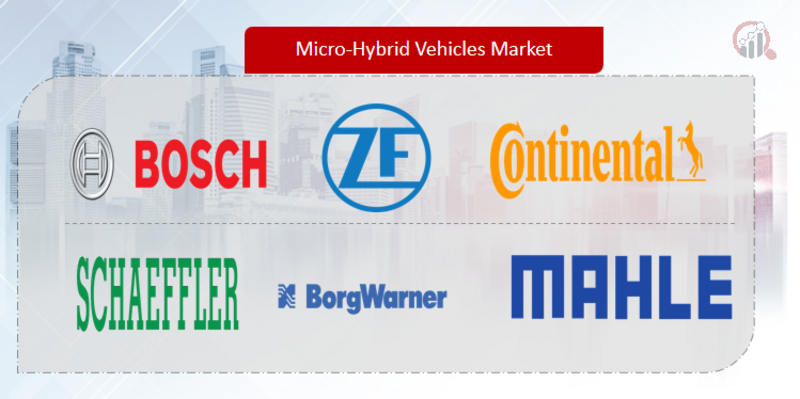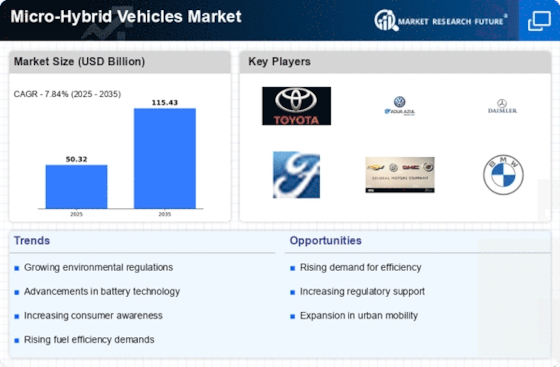Top Industry Leaders in the Micro-Hybrid Vehicles Market

*Disclaimer: List of key companies in no particular order
Latest Company Updates:
Bridging the Gap: Exploring the Competitive Landscape of the Micro-Hybrid Vehicle Market
In the bustling arena of automotive sustainability, a silent champion emerges – the micro-hybrid vehicle market. Though not boasting the full electric punch, these fuel-sipping machines bridge the gap between conventional cars and their electrified cousins, offering a taste of eco-friendliness with a familiar driving experience. This dynamic space hums with activity, with established giants, nimble startups, and regional challengers vying for a share in the green driving revolution. Let's navigate the key strategies, market dynamics, and future trends shaping this evolving landscape.
Key Player Strategies:
Global Titans: Companies like Toyota, Honda, and Suzuki leverage their extensive experience, diverse model portfolios, and strong brand recognition to maintain their dominance. They cater to a broad customer base, offering micro-hybrid versions of popular compact cars like the Toyota Yaris Hybrid and the Honda Jazz Hybrid. Toyota's leadership in hybrid technology makes them a clear champion in this space.
Technology Disruptors: Startups like Zymer and MicroHybrid Systems are disrupting the market with advanced micro-hybrid technologies like 48V systems and regenerative braking optimization. They cater to tech-savvy customers seeking increased fuel efficiency and improved performance. Zymer's 48V mild hybrid system exemplifies their focus on next-generation micro-hybrid solutions.
Cost-Effective Challengers: Chinese manufacturers like Chery and Geely are making waves with competitively priced micro-hybrids, targeting budget-conscious buyers in emerging markets. They focus on affordability and basic functionality, offering alternatives to premium brands. Chery's Arrizo 5e hybrid showcases their focus on cost-competitive green solutions.
Regional Champions: Companies like Maruti Suzuki in India and Tata Motors in Southeast Asia excel in specific geographic regions, leveraging strong local relationships and deep understanding of regional regulations and customer preferences. They offer tailored micro-hybrid models and service networks specific to their markets. Tata Nexon hybrid exemplifies their focus on regional market adaptation.
Factors for Market Share Analysis:
Fuel Efficiency and Emission Reduction: Achieving significant fuel savings and CO2 emission reductions compared to conventional gasoline vehicles is the heart of the micro-hybrid value proposition. Companies offering the best efficiency gains stand out.
Cost and Affordability: Balancing advanced features with competitive pricing is vital for mass adoption, particularly in cost-sensitive markets. Companies offering affordable micro-hybrid options without compromising quality gain an edge.
Technological Innovation: Investing in R&D for next-generation micro-hybrid technologies like higher voltage systems, improved energy recuperation, and integration with electric vehicle technologies is crucial for staying ahead of the curve. Companies leading in innovation attract early adopters and premium contracts.
Availability and Model Portfolio: Offering a diverse range of micro-hybrid models across different segments (sedans, SUVs) caters to a wider customer base and expands market reach. Companies with comprehensive portfolios gain an edge.
New and Emerging Trends:
Focus on 48V Systems: Moving beyond basic stop-start systems and employing higher voltage 48V systems allows for increased energy recuperation, more powerful electric motors, and potentially greater fuel efficiency gains. Companies investing in 48V technology stand out in this evolving space.
Hybridization of SUVs and Crossovers: Integrating micro-hybrid systems into popular SUV and crossover segments caters to the growing demand for fuel-efficient options in these categories. Companies offering hybridized SUVs and crossovers capitalize on this trend.
Integration with Electric Vehicle Technology: Blending micro-hybrid features with components from electric vehicles, like advanced battery systems and regenerative braking, can further improve fuel efficiency and pave the way for future electrification. Companies exploring this technology gain a head start in the evolving landscape.
Focus on Sustainability and Lifecycle Analysis: Demonstrating commitment to sustainable practices throughout the vehicle lifecycle, from sourcing materials to responsible battery recycling, attracts environmentally conscious customers and potential regulatory benefits. Companies prioritizing sustainability gain an edge.
Overall Competitive Scenario:
The micro-hybrid vehicle market is a dynamic and exciting space with diverse players employing varied strategies. Established giants leverage their reach and brand recognition, while technology disruptors introduce innovative solutions. Cost-effective challengers cater to budget-conscious buyers, and regional champions excel in specific markets. Factors like fuel efficiency, affordability, technological innovation, and model portfolio play a crucial role in market share analysis. New trends like 48V systems, SUV hybridization, EV technology integration, and sustainability focus offer exciting growth opportunities. To succeed in this evolving market, players must prioritize innovation, cater to diverse customer needs, embrace sustainable practices, and explore technology-driven solutions. By bridging the gap between conventional cars and full electrification with efficient and affordable micro-hybrid options, they can secure a dominant position in this green driving revolution.
Mazda Motor Corporation (Japan):
• Skyactiv-M Hybrid Technology: Mazda offers its Skyactiv-M hybrid system in various models like Mazda CX-30 and Mazda 3.
Daimler AG (Germany):
• EQ Boost Mild Hybrid System: Mercedes-Benz uses its EQ Boost mild hybrid system in several models like the C-Class and the E-Class.
Subaru (Japan):
• e-Boxer Mild Hybrid System: Subaru offers its e-Boxer mild hybrid system in models like the Forester and the Crosstrek.
Audi AG (Germany):
• 48V Mild Hybrid System: Audi uses its 48V mild hybrid system in various models like the A4 and the Q5.
Kia Motors Corporation (South Korea):
• EcoDynamics Mild Hybrid System: Kia offers its EcoDynamics mild hybrid system in models like the Sportage and the Niro.
Top listed global companies in the industry are:
Mazda Motor Corporation (Japan), Daimler AG (Germany), Subaru (Japan), Audi AG (Germany), Kia Motors Corporation (South Korea), Porsche AG (Germany), Jaguar Land Rover Automotive PLC (U.K.), Mahindra and Mahindra Limited (India), Hyundai Motor Company (South Korea), BMW AG (Germany)











